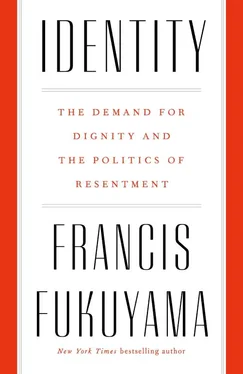2
THE THIRD PART OF THE SOUL
Theories of politics have typically been built on top of theories of human behavior. Theories tease out regularities in human action from the mass of empirical information we receive about the world around us and hopefully draw causal connections between these actions and the surrounding environment. The ability to theorize is an important factor in the evolutionary success of the human species. Many practical people scorn theories and theorizing, but they act all the time upon unarticulated theories that they simply fail to acknowledge.
Modern economics is based on one such theory, which is that human beings are “rational utility maximizers”: they are individuals who use their formidable cognitive abilities to benefit their self-interest. Embedded in this theory are several further assumptions. One is that the unit of account is an individual, as opposed to a family, a tribe, a nation, or some other type of social group. To the extent that people cooperate with one another, it is because they calculate that cooperation will serve their individual self-interest better than if they act on their own.
The second assumption concerns the nature of “utility,” the individual preferences—for a car, for sexual gratification, for a pleasant vacation—that make up what economists call a person’s “utility function.” Many economists would argue that their science says nothing about the ultimate preferences or utilities that people choose; that’s up to individuals. Economics speaks only to the ways in which preferences are rationally pursued. Thus a hedge fund manager seeking to earn another billion dollars and a soldier who falls on a grenade to save his buddies are both maximizing their different preferences. Presumably, suicide bombers, who have unfortunately become part of the twenty-first-century political landscape, are simply trying to maximize the number of virgins they will meet in heaven.
The problem is that economic theory has little predictive value if preferences are not limited to something like material self-interest, such as the pursuit of income or wealth. If one broadens the notion of utility to include extremes of both selfish and altruistic behavior, one is not saying much more than the tautology that people will pursue whatever it is they pursue. What one really needs is a theory of why some people pursue money and security, while others choose to die for a cause or to give time and money to help other people. To say that Mother Teresa and a Wall Street hedge fund manager are both maximizing their utility misses something important about their motivations.
In practice, most economists indeed assume that utility is based on some form of material self-interest, which will trump other kinds of motivations. This is a view shared by both contemporary free market economists and classical Marxists, the latter of whom maintained that history was shaped by social classes pursuing their economic self-interest. Economics has become a dominant and prestigious social science today because people do much of the time behave according to the economists’ more restrictive version of human motivation. Material incentives matter. In Communist China, agricultural productivity on collective farms was low because peasants were not allowed to keep any surplus they produced; they would shirk rather than work hard. A saying in the former Communist world was that “they pretend to pay us and we pretend to work.” When incentives were changed in the late 1970s to allow peasants to keep their surplus, agricultural output doubled within four years. One of the causes of the 2008 financial crisis was that investment bankers were rewarded for short-term profits and were not punished when their risky investments blew up a few years later. Fixing the problem would require changing those incentives.
But while the standard economic model does explain a good deal of human behavior, it also has a lot of weaknesses. Over the past couple of decades, behavioral economists and psychologists such as Daniel Kahneman and Amos Tversky have attacked the model’s underlying assumptions by showing that people are not rational in practice, that they for example choose default behaviors over more optimal strategies or economize on the hard work of thinking by copying the behavior of others around them. {1} 1 Daniel Kahneman, Thinking, Fast and Slow (New York: Farrar, Straus and Giroux, 2013).
While behavioral economics has underlined the weaknesses of the existing rational-choice paradigm, it has not posited a clear alternative model of human behavior. In particular, it has not had much to say about the nature of people’s underlying preferences. Economic theory does not satisfactorily explain either the soldier falling on the grenade, or the suicide bomber, or a host of other cases where something other than material self-interest appears to be in play. It is hard to say that we “desire” things that are painful, dangerous, or costly in the same way we desire food or money in the bank. So we need to look to other accounts of human behavior that go beyond the economic ones that are so dominant today. This broader understanding has always existed; the problem is that we often forget things we once knew.
Theories of human behavior are built on theories of human nature: regularities that arise out of a universally shared human biology, as opposed to those that are rooted in the norms or customs of the different communities in which people live. The boundary line between nature and nurture is highly contested today, but few people would deny that the two poles of this dichotomy exist. Fortunately, one does not have to establish the boundary precisely in order to develop a theory that gives us useful insight into human motivation.
Early modern thinkers such as Thomas Hobbes, John Locke, and Jean-Jacques Rousseau theorized at length about the “state of nature,” a primordial time before the emergence of human society. The state of nature is, however, just a metaphor for human nature; that is, the most basic characteristics of human beings that exist independently of one’s particular society or culture. In the Western philosophical tradition, such discussions of human nature go much further back, at least to Plato’s Republic .
The Republic is a dialogue between the philosopher Socrates and two young aristocratic Athenians, Adeimantus and his brother Glaucon, about the nature of a just city. After debunking several existing theories of justice, such as Thrasymachus’ assertion that justice is nothing more than the self-interest of the strong, Socrates constructs a just city “in speech,” based on an exploration of the nature of the soul. The word soul (Greek psyche ) is not much used anymore, but as the etymology suggests, the discipline of psychology essentially studies the same subject.
The key discussion of the nature of the soul takes place in Book IV. Socrates notes that a desiring part seeks, for example, food and water. But at times a thirsty man pulls back from drinking because he knows the water is tainted and could lead to sickness. Socrates asks, “Isn’t there something in their soul bidding them to drink and something forbidding them to do so, something different that masters that which bids?” {2} 2 The Republic of Plato , trans., with notes and an interpretive essay, by Allan Bloom (New York: Basic Books, 1968), variorum sec. 439b–c.
Adeimantus and Socrates agree that this second, different part of the soul is the calculating part, and that it can operate at cross-purposes from the irrational, desiring part of the soul.
Socrates and Adeimantus have at this point described the modern economic model: the desiring part corresponds to individual preferences, while the calculating part is the rational maximizer. While Sigmund Freud is no longer taken as seriously as he once was, this distinction corresponds roughly to his concept of the desiring id and the ego that kept those desires under control, largely the result of social pressures. But Socrates points to another type of behavior by relating the story of the Athenian Leontius, who passes by a pile of corpses left by the public executioner. Leontius wants to look at the corpses, but at the same time tries to avoid doing so; after an internal struggle, he looks, saying, “Look, you damned wretches, take your fill of the fair sight.” {3} 3 Ibid., 439e–440a.
Leontius, while tempted to indulge his desire to see the corpses, knew it was ignoble; that he gave in to his cravings aroused his anger and self-loathing. Socrates asks:
Читать дальше












